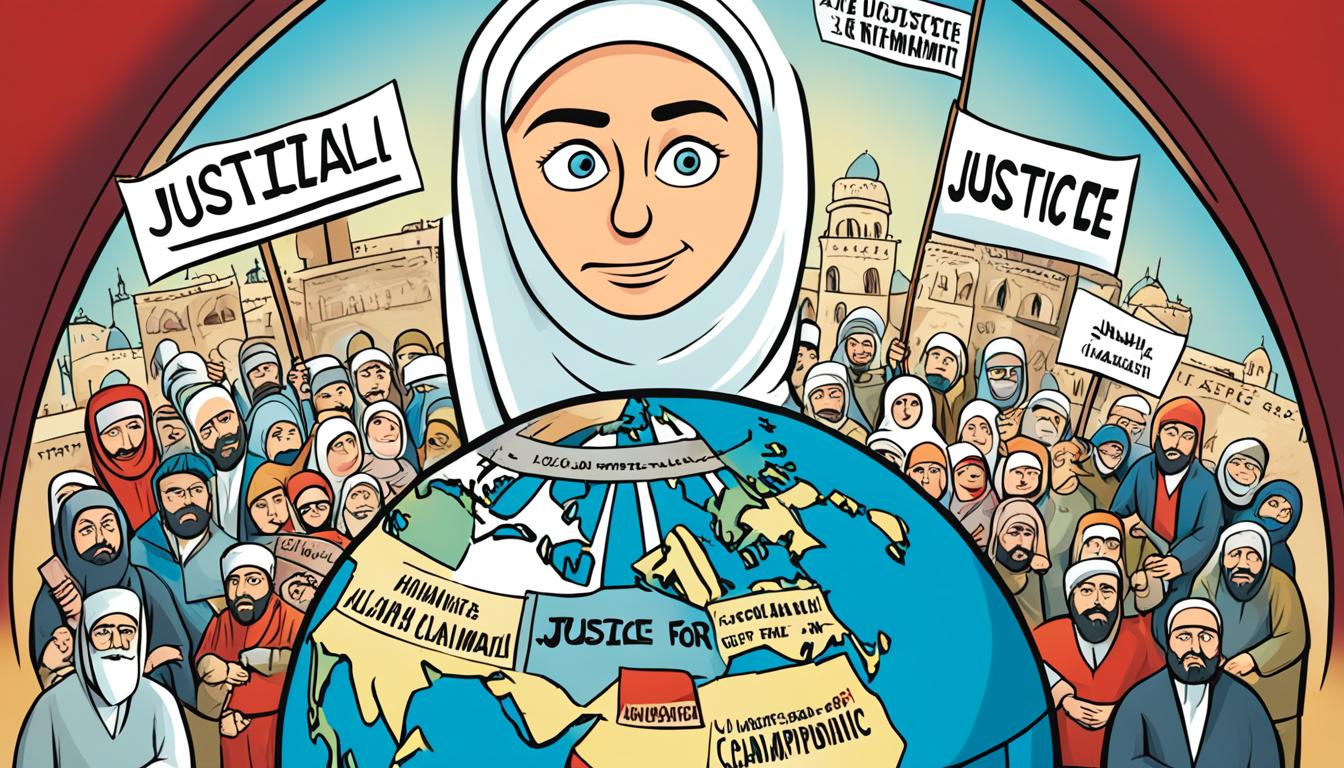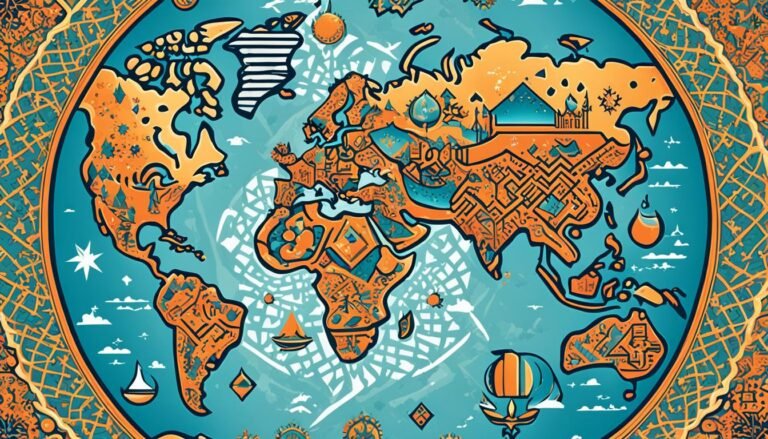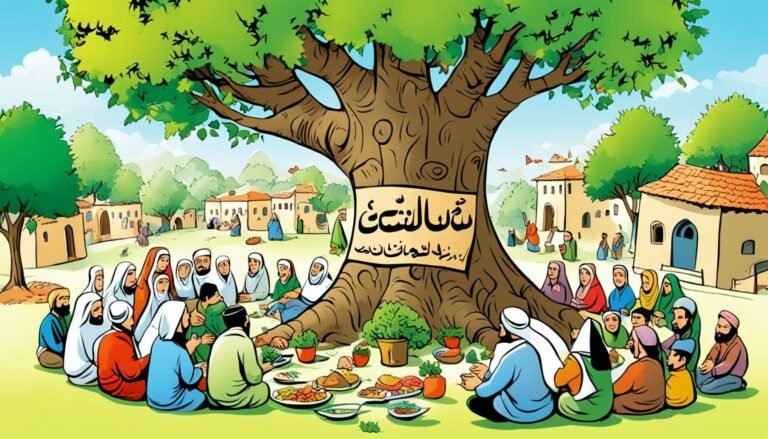Islamic Responses to Global Human Rights Issues
Have you ever thought about how Islam fits with global human rights? Looking into Islamic views on human rights shows a deep connection between faith and rights. We’ll explore how Islam sees human rights and the tricky balance between faith and rights.
This journey will show us how Islamic teachings shape human rights discussions. We’ll also see the hurdles in different cultures, like how Shari’a law affects Muslims.
Key Takeaways
- The complexity of the relationship between Islam and global human rights.
- Shari’a law presents specific considerations for Muslim men, women, and non-Muslims.
- Significant Muslim movements advocate for the application of historical Shari’a principles.
- The introduction of the Cairo Declaration on Human Rights in Islam challenges Western human rights norms.
- Implementing human rights in Muslim countries often faces cultural and legal barriers.
- Radicalism and fundamentalism can negatively impact religious minority rights.
Introduction to Human Rights in Islam
Human rights in Islam is a topic that blends religious and ethical views on universal human rights. It’s important to see how faith and rights work together. This mix shows how Islamic teachings and human rights can support each other. The debate shows the complex relationship between religion and human rights in Muslim societies.
Understanding the Intersection of Religion and Human Rights
Scholars have different opinions on how Islam and human rights match up. Some believe Islamic law supports human dignity. Others think traditional views might not accept some modern rights. This debate shows a push to mix Islamic values with today’s rights ideas.
The Role of the Universal Declaration of Human Rights (UDHR)
The UDHR, made in 1948, has shaped global human rights talks, even in Islamic areas. After the UDHR, the Islamic Councils made the Universal Islamic Declaration of Human Rights (UIDHR) and the Cairo Declaration on Human Rights in Islam (CDHRI). These documents try to fit human rights with Islamic beliefs while keeping up with global standards.
Key Terms and Concepts in the Debate
Knowing key terms is vital in the Islam and human rights debate. Ideas like universalism and cultural relativism are crucial. These views affect how scholars see and apply human rights in Muslim countries.
| Declaration | Year Adopted | Notes |
|---|---|---|
| Universal Islamic Declaration of Human Rights (UIDHR) | 1981 | Drafted by Islamic Councils in Paris and London. |
| Cairo Declaration on Human Rights in Islam (CDHRI) | 1990 | Aims to define human rights within an Islamic framework. |
| Arab Charter on Human Rights (ACHR) | 2004 | Emphasizes state responsibility toward human rights. |
Looking into these points, we see human rights in Islam as a complex topic. It’s about tradition, change, and bringing Islamic teachings and universal human rights together.
Historical Context of Human Rights Discourse in the Muslim World
The history of human rights in the Muslim world is complex. It has changed a lot since the Universal Declaration of Human Rights in 1948. Different views and changes show how these ideas have been accepted and debated in various Muslim societies.
Evolving Perspectives since the UDHR in 1948
After World War II, the United Nations created new laws that mainly came from Western ideas of rights. Many Muslim countries signed the UDHR, leading to two kinds of talks about human rights. There was a debate inside Muslim communities and another outside about ‘Islam and human rights’. These differences have led to a lot of study, especially after big political events like the Iranian revolution and the ‘war on terror’. Scholars are now looking into how Sharia, government, and human rights fit together.
The Impact of Political Islam on Human Rights Views
Political Islam has changed how people see human rights in the Muslim world today. Some think Sharia law and modern human rights can’t mix, which causes confusion. In 2003, a European Court ruling said Sharia and the European Convention on Human Rights don’t match. This issue often comes from mixing human rights with Western culture, which some experts say ignores the history of human rights.
Yet, many Muslim scholars agree that basic human rights are key. They see these rights as important but through the lens of Islamic values.
Origins of the Debates on Human Rights and Islam
Over the years, the topic of human rights in Islam has changed a lot. Scholars have different views on Islamic teachings on human rights and if Islam fits with human rights. These views show how tradition, culture, and modern times mix together.
Types of Interpretations Among Scholars
Scholars in the Islamic world have many views on human rights. They can be grouped into three main types:
- Traditionalist View: This view sticks to old texts and the teachings of Islam about human rights.
- Modernist Approach: This group tries to mix Islamic values with today’s human rights, focusing on common goals.
- Critical Perspective: This view questions old interpretations, looking at how they fit with today’s human rights ideas.
Famous Historical Positions
Old stances on human rights in Islam still affect today’s debates. For example, Saudi Arabia didn’t vote for the Universal Declaration of Human Rights in 1948. This was because Muslim-majority countries were worried about its effects.
Later, in 1990, the Organization of Islamic Cooperation (OIC) came out with the Cairo Declaration on Human Rights in Islam. It aimed to make human rights fit with Islamic beliefs.
Some saw this as a step forward, but others had doubts. The Cairo Declaration didn’t promise equality for everyone, especially women and non-Muslims. It also made Sharia law the main guide, leaving some rights unclear. These old positions still influence the ongoing debates on compatibility of Islam and human rights.
Islamic Teachings on Human Rights
Islamic teachings offer a strong base for understanding human rights. They are based on the Quran and Hadith. The focus on human dignity is key to Islamic ethics and human rights. It guides Muslims in their personal and community lives.
The Quranic Foundations Supporting Human Dignity
The Holy Quran deeply values human dignity and respect. It says, “We created human beings in the finest state” (Q. 95:4) and “We have honored the children of Adam” (Q. 17:70). These verses show that every person has rights because of how they were created.
The Quran also bans murder, except in legal situations. This shows a high value on life. It warns harshly against those who break this rule, as seen in Quran 4:93.
Hadith and Islamic Jurisprudence Insights
The Hadith is key in making human rights clear in Islamic law. The Prophet Muhammad taught the value of privacy. He said one must not enter homes without permission and reading others’ letters is wrong.
Islamic law also protects people’s property rights. It says taking things without permission is wrong. These teachings help guide spiritual and legal norms for a peaceful society.
The Quran and Hadith together offer a full view of Islamic ethics and human rights. They show a deep understanding of human dignity and the rights that come with it.
Major Islamic Declarations and Human Rights Frameworks
The world of human rights in Islamic contexts has seen many declarations. The Cairo Declaration on Human Rights in Islam is one of them. It combines religious beliefs with today’s human rights ideas. This declaration talks about the rights and duties of individuals, promoting dignity and justice.
Overview of the Cairo Declaration on Human Rights in Islam
In August 1990, 45 member states of the Organisation of Islamic Cooperation (OIC) adopted the Cairo Declaration. It aims to blend Islamic principles with modern human rights. The document says that rights and duties are connected, and human rights come from Divine Law.
It lists important points, such as:
- The sanctity of human life and protection from harm.
- The right to freedom in physical, cultural, economic, and political ways.
- The principle of equality before the law, stopping discrimination by religion, race, sex, or language.
- The right to justice and fair trials by independent courts.
This shows a framework where duties and rights go hand in hand. It reflects the traditional Islamic law’s focus on duties.
Comparison with Universal Human Rights Norms
When we look at the Cairo Declaration and the Universal Declaration of Human Rights (UDHR), we see both similarities and differences. Both support basic human rights, but they see responsibilities differently. The UDHR mainly talks about individual rights, not duties. The Cairo Declaration, however, puts duties right alongside rights, following Islamic law.
This difference highlights a big gap in how we talk about human rights worldwide. The Cairo Declaration’s focus on duties shows a key part of Islamic thought that’s often missed in global human rights talks.
Islamic Responses to Global Human Rights Issues
The debate on human rights in Islam is complex. It involves cultural and universal views. Muslim countries face the challenge of balancing their history and culture with human rights. Shari’a, or Islamic law, plays a big role in how rights are seen and applied in different places.
Cultural Relativism Versus Universalism in Human Rights
There are two main views on human rights: cultural relativism and universalism. Cultural relativism says rights should fit with local customs. Universalism believes in rights that apply everywhere, no matter the culture. Islamic scholars often find a middle ground, which can lead to different views on human rights.
The Impact of Sharia on Contemporary Human Rights Practices
Shari’a affects human rights in many Muslim-majority countries. It teaches about justice, equality, and protecting life and freedom. But, in some places, strong governments and authoritarian rules limit political freedom and human rights.
- Challenges include limited political freedom and suppressing dissent.
- Different views on Islamic law make it hard to follow human rights.
- Supporting NGOs and civil society is key to improving human rights advocacy.
The Cairo Declaration on Human Rights tried to address these issues but was criticized. It didn’t meet universal human rights standards. Getting human rights into laws is still a big challenge.
Challenges in the Implementation of Human Rights in Muslim Countries
The implementation of human rights in Muslim countries faces many challenges. These challenges come from both legal and cultural issues. Laws and cultural norms often make it hard to uphold human rights.
Legal Frameworks and Cultural Barriers
In Muslim countries, legal systems can make it hard to protect human rights. Many use a mix of Sharia and civil law, causing confusion. Laws may also support traditional practices that limit individual freedoms, especially for women and minorities.
Cultural values can also hinder human rights. They often put community needs over individual rights. This can make it hard to speak out against rights violations.
Case Studies of Human Rights Violations
There are many examples of human rights violations in the region. In Saudi Arabia, over 777,000 foreign workers were arrested for violating laws. More than 40,000 were caught for crossing the border illegally from Yemen.
In Iran, 576 people were executed in 2022, often for their beliefs. The government also targeted Baha’is, imprisoning over 1,000. The conflict in Palestine is another issue, with over 21,000 Gazans killed and 1.9 million displaced.
These cases show the need for change and accountability in Muslim countries.
| Country | Reported Violations | Key Statistics |
|---|---|---|
| Saudi Arabia | Migrant arrests and labor exploitation | 468,000 foreign nationals returned; 40,000 arrests |
| Iran | Executions and religious persecution | 576 executions in 2022; 1,000 Baha’is imprisoned |
| Palestine | Violence and displacement | 21,000 Gazans killed; 1.9 million displaced |
Islamic Ethics and Human Rights Advocacy
Islamic ethics are key in fighting for human rights. They focus on justice, mercy, and dignity for everyone. These values are core to Islam and match the goals of groups that support human rights. Groups like the Muslim Women’s Network and the Islamic Circle of North America use Islamic teachings to push for human rights.
The Role of Civil Society Organizations in Promoting Rights
Civil society groups are crucial in spreading Islamic ethics and fighting for human rights. They stand up for the rights of those who are left behind and work to stop human trafficking. For example, Tunisia ended slavery in 1846 thanks to community efforts and moral values.
Studies by Ramon Harvey show how ethics and mercy are seen in Islam. This helps us understand justice better.
Success Stories in Human Rights Advocacy
There are many stories that show how Islamic ethics help fight for human rights. Projects that help people with disabilities show Islamic communities’ dedication to dignity and rights. Roger Collier’s study shows how compassion and Islamic values can lead to progress.
Recent work by Ozcan Keles talks about how Islam can respond to today’s human rights issues. This shows that ethics can bring about change in different places.
Source Links
- Islamic Law, International Relations, and Human Rights: Challenge and Response
- Protests in Iran and Human Rights
- Cairo Declaration on Human Rights in Islam
- Human Rights from an Islamic Perspective: A Critical Review of Arabic Peer-Reviewed Articles
- No title found
- No title found
- Islam and the Realization of Human Rights in the Muslim World: A Reflection on Two Essential Approaches and Two Divergent Perspectives
- Islam and Human Rights: A 50 Year Retrospective
- The Organization of Islamic Cooperation’s declaration on human rights: Promises and pitfalls | Brookings
- 2 Human Rights and Islamic Law
- Human Rights in Islam
- No title found
- Microsoft Word – Morgan-Foster_Islam_Final.doc
- University of Minnesota Human Rights Library
- Human rights in the Middle East
- Contradictions and Consistencies: Human Rights in the Universal Declaration and Islamic Teachings Amidst Global Conflicts
- The forgotten Islamic human rights document
- Human rights in Saudi Arabia
- Iran – United States Department of State
- Human rights in Middle East and North Africa Regional Overview
- A Sacred Duty: Islam and Social Justice | Yaqeen Institute for Islamic Research
- Problematising the Islamic Responses to Human Rights: Turning to Practice







